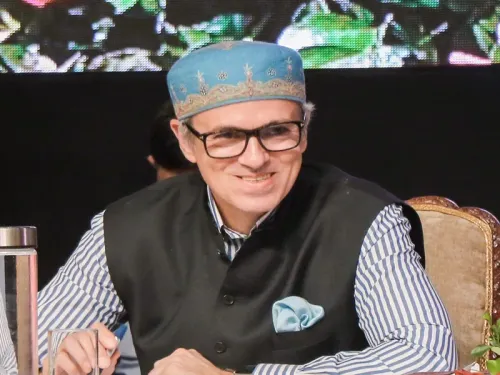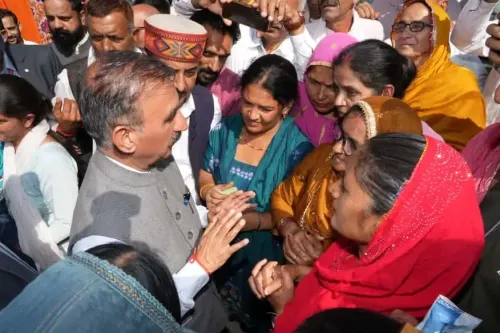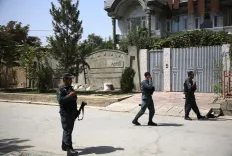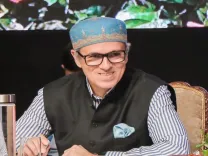Did PM Modi Start His Campaign from Karpoori Gram to Honor Bihar’s Social Legacy?

Synopsis
Key Takeaways
- PM Modi launched the NDA campaign from Karpoori Gram.
- Karpoori Thakur is a significant figure in Bihar’s history.
- The campaign signals the BJP's commitment to social justice.
- Backward classes comprise over 63% of Bihar's population.
- Thakur’s legacy continues to influence contemporary politics.
New Delhi, Oct 24 (NationPress) Prime Minister Narendra Modi initiated the National Democratic Alliance (NDA) campaign for the Bihar Assembly election from Karpoori Gram, honoring the legacy of former Chief Minister Karpoori Thakur on Friday.
PM Modi has consistently acknowledged Thakur’s significant contributions to society, focusing on social justice and empowering disadvantaged groups. The NDA government, led by Modi, decided last year to award Bihar’s esteemed Socialist leader the prestigious Bharat Ratna. Furthermore, in July, Railway Minister Ashwini Vaishnaw laid the foundation stone for Karpoorigram Station with a budget of approximately ₹3.30 crore.
Located in Samastipur district of Bihar, Pitaunjhia might have remained an unremarkable location if not for its connection to Thakur, who was born there. The village was renamed Karpoori Gram in tribute to the “Jan Nayak (people’s leader)” after his passing in 1988.
This venue aimed to reassure regional leaders, alliance partners, and caste leaders that the Bharatiya Janata Party (BJP) acknowledges local icons and their concerns. It conveyed an outreach to constituents who have historically turned to figures like Karpoori Thakur for social and economic justice.
Interestingly, Thakur’s elder son, Ram Nath, serves as a member of the NDA coalition’s Janata Dal (United) in the Rajya Sabha, indicating that the commencement of the Prime Minister’s campaign from Karpoorigram was not solely a political maneuver.
Thakur is remembered in Bihar as a proponent of social justice and pro-reservation politics. By launching the campaign there, the BJP signals its intent to engage not only in development discussions but also in the realm of social identity and backward class politics.
Thakur first became Chief Minister in December 1970 as the leader of the Socialist Party, yet his tenure was short-lived, lasting only around five months.
During the anti-Emergency movement in the 1970s, Thakur collaborated closely with Jayaprakash Narayan. Following the Janata Party's rise to power, Thakur resumed the Chief Minister role in June 1977 and chose to implement the Mungeri Lal Commission report, which recommended reservations for Backward Castes in government jobs. This decision garnered criticism and led to his exit in less than two years of his second term.
Presently, Bihar’s caste survey results highlight the significance of backward groups in the state, which political parties are keen to attract for electoral support. According to the survey, Other Backward Classes (OBCs), including both Backward Castes (BCs) and Extremely Backward Classes (EBCs), make up over 63% of Bihar’s population, with EBCs accounting for approximately 36%.
With around 112 sub-castes, these groups can influence election outcomes in approximately 120 Assembly constituencies, particularly in regions like Mithila, Magadh, and Seemanchal. The survey also indicated that Yadavs constitute 14.26%, Muslims 17.7%, and upper castes 15.52% of the state’s population.
Political leaders across various parties, including Lalu Prasad Yadav and Nitish Kumar, have relied on EBC support. During the 1990s, Lalu incorporated EBCs into his Muslim-Yadav (MY) strategy to challenge upper-caste dominance, but over time, the EBCs felt neglected as Yadav influence expanded.
Current Chief Minister Nitish Kumar has implemented reservations for EBCs in jobs and education, including local governance, along with welfare initiatives like bicycles for schoolgirls and scholarships for Mahadalits, thus solidifying the NDA's position in the state.
By launching the campaign at Karpoorigram, the Prime Minister has demonstrated respect for the state’s social justice legacy, countering the opposition’s claim as the exclusive guardian of backward classes.









